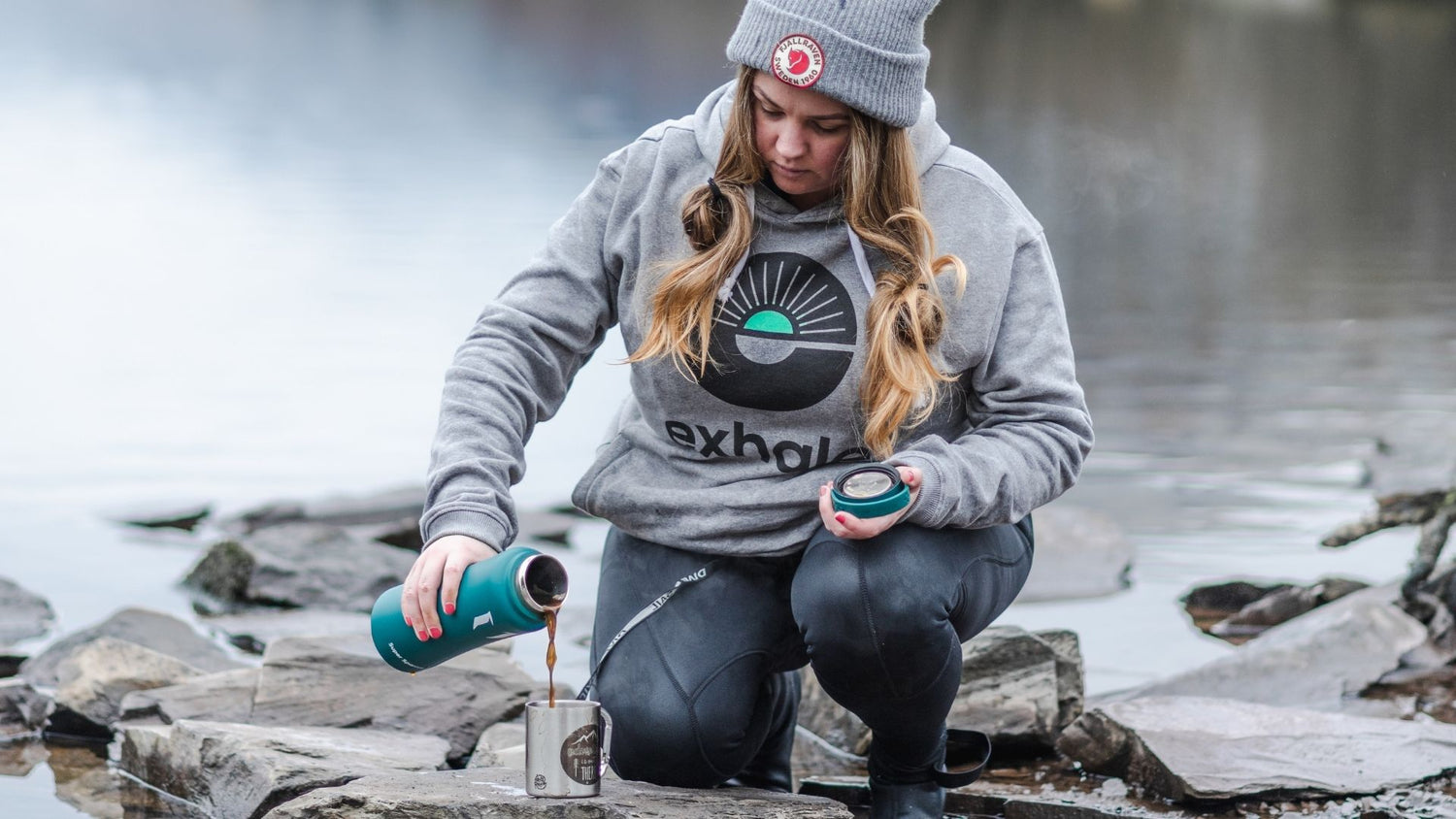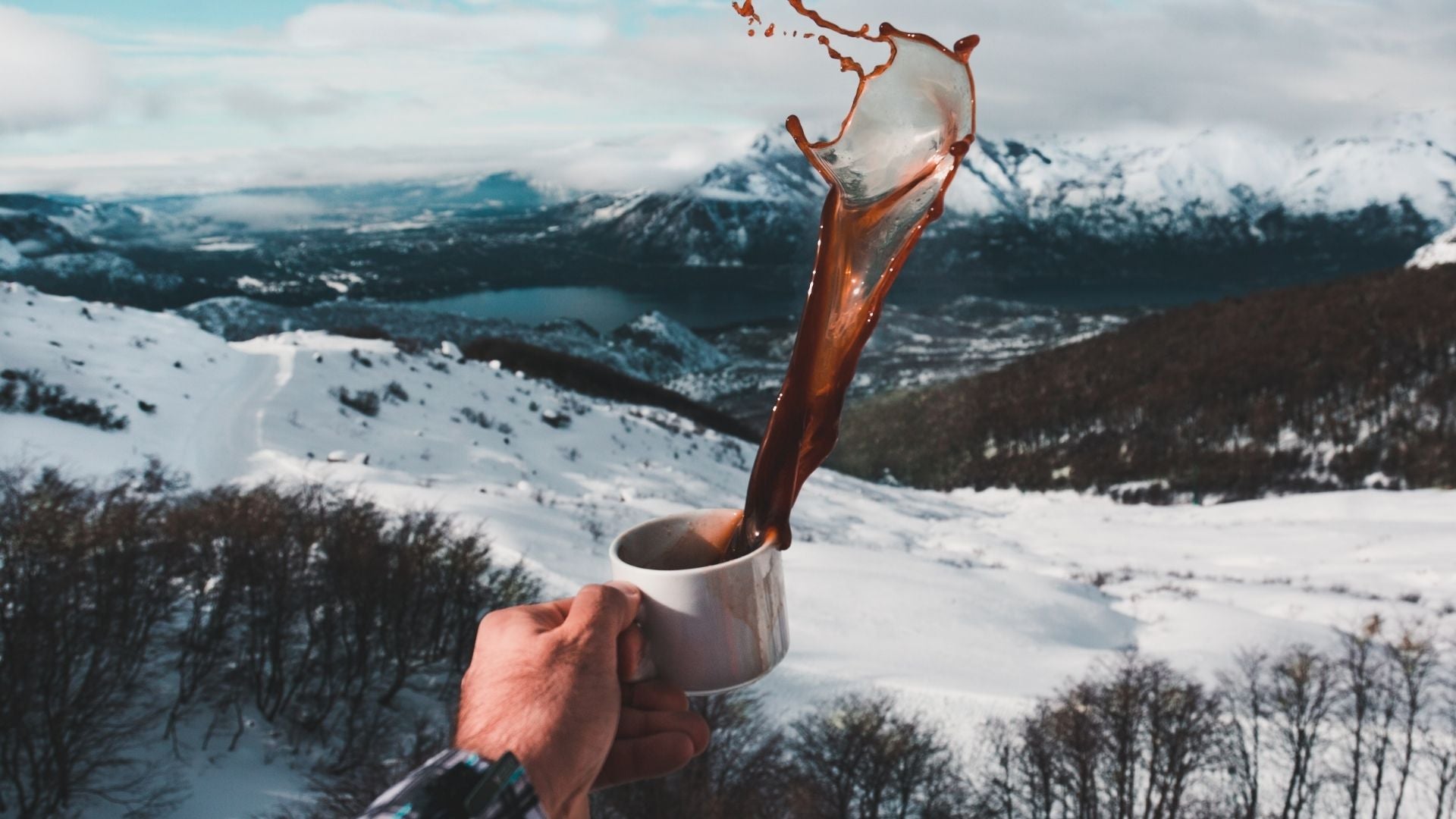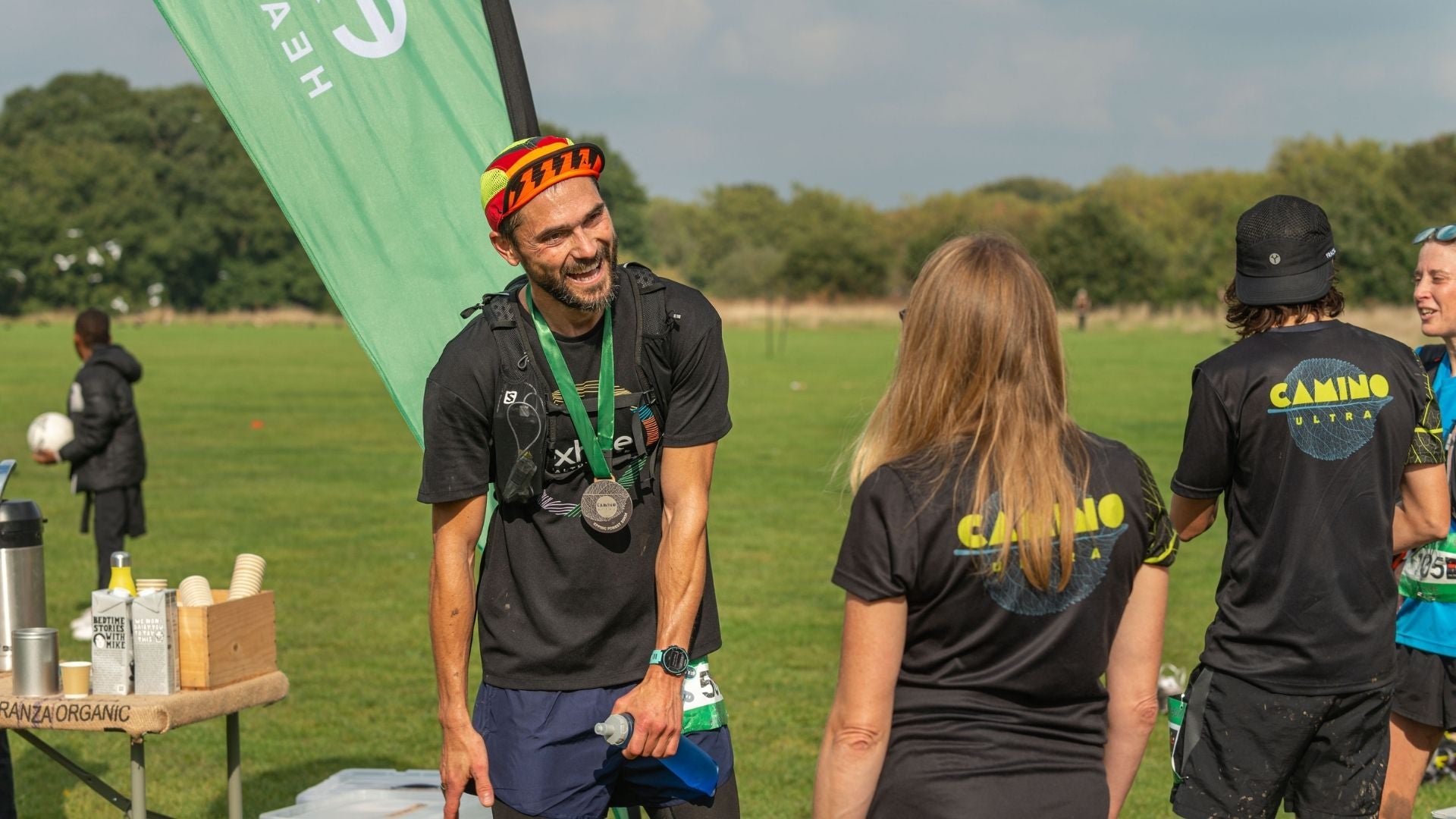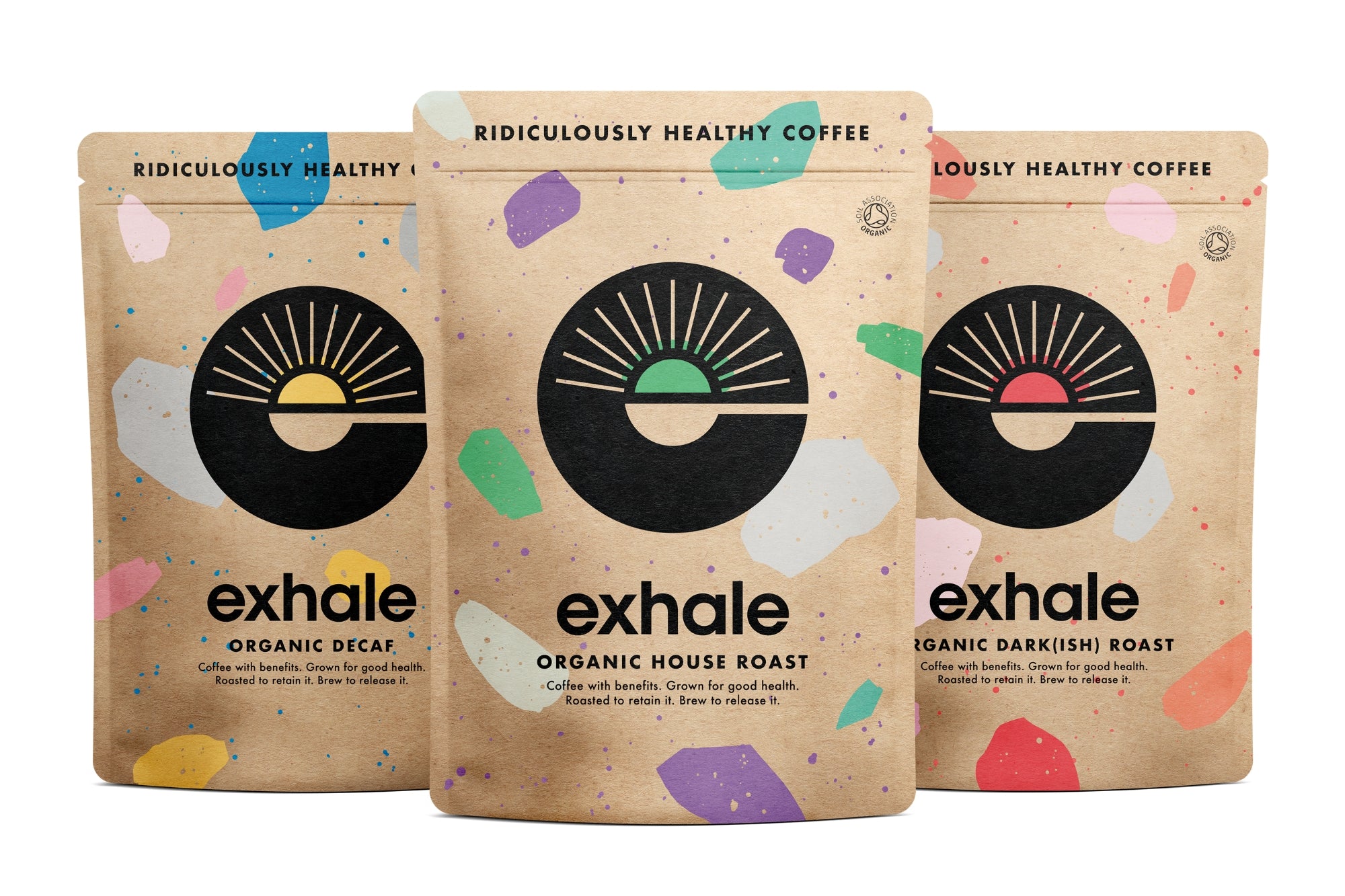Anxiety and jitters, and their relationship to coffee and caffeine is something we get asked about all the time. It’s very common, and something that affects people in lots of different ways, on very different scales—from one too many cups of coffee giving you the shakes and feelings of unease, to people with pre-existing anxiety disorders reporting their symptoms being eased, or worsened by caffeine.
It’s a big topic, and one that needed an expert to help us navigate. So, we sat down with exhale’s Chief Wellness Officer, Alex Manos to shed some light on the subject.
exhale: What’s the difference between anxiety and the jitters?
Alex Manos: I think it’s important to differentiate them. Anxiety can be classified as general anxiety, panic disorder, phobias, social anxiety, or PTSD. These can be chronic and extremely debilitating, or specific to environmental circumstances.
Jitters are the occasional experience we have after drinking too much caffeine–this may include generalised anxiety or a rapid heartrate.

e: What’s the link between coffee and anxiety?
A: A lot of studies about coffee and stress centre on people who already have anxiety disorders, which might skew how people without anxiety can relate to the results.
Your genes could also mean you’re more vulnerable to coffee-related stress, as it comes down to how your body is geared to process caffeine.
There’s also a consideration around new coffee drinkers and those who have drunk coffee for a long time—we can become a little less sensitised to coffee over time. So, for long-time coffee drinkers, it might not affect anxiety as much.
It’s hard to make a direct correlation between the two without thinking about all the other things that might be contributing to someone's stress or anxiety levels. Think of it as accumulative—if you have concerns over finances or a deadline at work for example, your base level of stress or anxiety is already higher and thus a stimulant like caffeine may increase this further.
e: Why does caffeine make you feel anxious and/or jittery?
A: Caffeine stimulates the body into its "fight or flight" mode by boosting alertness through the central nervous system.
But, according to Duke University researcher James Lane, “...caffeine always exaggerates the effects of whatever stresses we are currently experiencing in everyday life.” So, as I mentioned earlier, it really all depends on your situation at the time. If you feel anxious or jittery, and then drink a coffee, chances are you’ll exacerbate those feelings.

e: So, caffeine can make anxiety symptoms worse?
AM: Yes, it can. It’s been shown to contribute to anxiety in many different groups ranging from secondary school children to those with panic disorder (some people may be more susceptible to feelings of anxiety post caffeine). (1)
It’s also got a lot to do with genetic variation. Depending on each individual's caffeine metabolism, and their unique physical and physiological responses to it—so two people with the exact same symptoms could react very differently after having a cup of coffee. (2)
e: Can coffee help anxiety?
AM: The right type might be able to...! Animal studies show that caffeic acid, a constituent in coffee may help, thanks to the possible anxiolytic and antidepressant effects of chlorogenic acid (an antioxidant polyphenol found in coffee—especially exhale coffee) and caffeine. (3) (4)
5 ways to ease the jitters
So, as you can see—whether or not you experience anxiety or the jitters after having caffeine is a very unique experience that’s down to your stress and anxiety levels, genetics, and how long you’ve been drinking coffee for. So, it’s really all down to trial and error to make sure your own coffee drinking is a pleasure, and not something that’s over-stimulating your fight or flight response.
That being said, here are some simple ways to make sure your anxiety isn’t triggered by your morning brew.
1. Drink high-polyphenol coffee
Chlorogenic acid is a polyphenol found in coffee (it’s especially high in Exhale coffee). It’s this compound that’s been shown to protect against anxiety and depression, by reducing oxidative stress in the body. (5)
In fact, our customers frequently feedback to us that they don’t get the jitters when drinking Exhale coffee proving that, in this case, the science really works in real life.

2. Breakfast first, then coffee
When you have food in your stomach, your body absorbs caffeine more slowly. And in fact, aside from avoiding the jitters, this is good practice in general.
Studies have shown that drinking coffee on an empty stomach can have a negative effect on your ability to tolerate and metabolise glucose—regardless of whether you’ve had a good night’s sleep. (6)(7)
3. Why go full caf, when you can half it?
To avoid anxiety and jitters, it’s a no brainer to simply reduce your caffeine intake. So, consider going with a half decaf/half caffeinated cup of coffee. Simply measure even quantities of each kind of bean, grind, and enjoy as normal.
4. Coffee with a chill-out chaser
Consider taking something like l-theanine, lemon balm, or magnesium with your coffee. Anecdotally, these calming nutrients may balance out the stimulation of the coffee.
L-theanine has been investigated alongside coffee intake and it has been shown to reduce anxiety. (8) And animal studies have also shown it improves sleep that would otherwise be disrupted by caffeine. (9)
5. As Wim Hof would say, “Breathe mother f****r!”
If you do yourself experiencing the jitters, calm your nervous system with some diaphragmatic breathing. Breathe in, and out, for 5 seconds each, through the nose. Breathe lightly–you shouldn’t be able to hear yourself breathe. And breathe deep in the belly–experiencing the rise and fall of your belly as you breathe in and out. This is a beautiful way to calm the mind and body.
Want to know more about how coffee can help your health? Read our blog to find out more.
References:
- (Astrid Nehlig, Effects of coffee/caffeine on brain health and disease: What should I tell my patients? Pract Neurol, 2016 ;16(2):89-95.)
- (Nanci S Guest et al., International society of sports nutrition position stand: caffeine and exercise performance, J Int Soc Sports Nutr, 2021 2;18(1):1.
- https://www.sciencedirect.com/science/article/pii/S1756464619305626
- (Adriana Farah and Juliana Lima (2019) Consumption of Chlorogenic Acids through Coffee and Health Implications, Beverages, 5, 11)
- (Seyed Fazel Nabavi et al., Chlorogenic Acid and Mental Diseases: From Chemistry to Medicine, Current Neuropharmacology, 2017, 15, 471-479)
- British Journal of Nutrition, Volume 124, Issue 10, 28 November 2020, pp. 1114 – 1120)
- https://www.sciencedaily.com/releases/2020/10/201002091053.htm
- Ai Yoto, Effects of L-theanine or caffeine intake on changes in blood pressure under physical and psychological stresses, J Physiol Anthropol, 2012 Oct 29;31(1):28.
- https://pubmed.ncbi.nlm.nih.gov/22285321/





2 comments
Annie wood
We have exchanged thoughts on this previously. I sampled standard coffee after not drinking coffee much for 40 years!!! I had some amazing responses to exhale until I pushed too far and tried it first thing on an empty tum where I did get the sweats and jitters. You kindly sent me a sample of your decaf to try and until the small amount of standard ran out I experimented with mixing the two in different ratios.
There is a part of me that craves being able to have the extra benefits of your standard and am at a loss to decide which one to chose for my first order.
I am so commited to optimising the health benefits and aiding my recovery from long Covid.
I have been in correspondence with a few of you especially Kaspar ( oo thank you for the chocolates- yum) and you gave all been so supportive and patient.
This article has given me yet more info to process and I am so grateful for that.
Decisions, decisions🤫
I’m not keen to grind a mix of beans as I’m not successful at that with the grinder I have and not keen to outlay more ££’s right now..
Ps the Zoe thing is fascinating and I’m deep into I’m currently on day 5 of logging everything I eat and watching my blood sugar responses.
It’s great they recognise Exhae coffee !
Thank you, you lovely lot for being part of my journey to fitness again.❤️
Richard
A few months ago there was a BBC story comparing the caffeine content in “like for like” high street coffee shops. How does Exhale compare?
Leave a comment
All comments are moderated before being published.
This site is protected by hCaptcha and the hCaptcha Privacy Policy and Terms of Service apply.